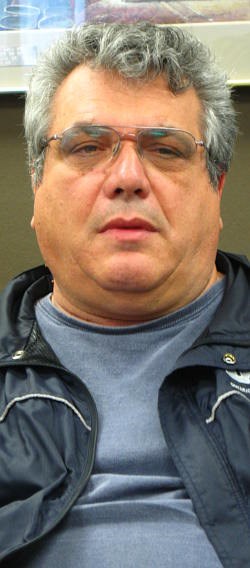Mike DaPrat knows something about what it feels like to be one of the 453 people whose illnesses were mapped during the Sault's recent occupational disease clinics.
DaPrat (shown), president of United Steelworkers Local 2251, is one of the cases mapped in the clinics that took place on May 7 and 8.
"I had to prove to the company that I had worked with asbestos and that I had worked with chemicals," DaPrat said during a media conference at the Union Hall on Wednesday afternoon. "And I also proved it to WSIB."
DaPrat said he got his diagnosis during negotiations in 2007, but he didn't go into detail about what that diagnosis was.
"That's not why we're doing this," he said. "We've been trying to do it since 2004."
The union wants to create a data base of Workplace Safety and Injury Board of Ontario (WSIB) claimants so their cases can be fully documented and processed more quickly.
It's also trying to make its members' workplaces safer by raising awareness, increasing industry standards and making more occupational diseases allowable by WSIB.
They're going about this through a series of occupational illness clinics, the next of which is June 13 from 8:30 a.m. to 4:30 p.m. at the Union Hall on Dennis Street and this one will be by appointment.
The union is asking participants to call the hall anytime during business hours to book an appointment because there won't be as many volunteers for this clinic as there were for the earlier sessions at Algoma University College.
"It's not pretty and it's not nice," DaPrat said. "But people who we suspect are going to die soon will go first," he said.
The clinics will be held until demand for them diminishes.
And DaPrat is worried about that.
"God help us if this is a maturing group because, if it is, this will never end," he said. "If I'm from the group of 1974, what about the group from the 80s and 90s? What were they exposed to? What will they be showing up with over the next 10, 20 or 30 years?"
The union expects about 60 to 70 more people to come forward to be mapped on June 13.
They will join the 438 people who have a total of 453 occupational diseases already mapped, some with multiple illnesses.
DaPrat said that the body map is a indication of what illnesses are affecting United Steelworker members and in what area of the body they are occurring.
The body map was created using non-identifying data gathered from or regarding USW members up to and including the May 7 and 8 clinics.
It shows only diagnosed illnesses, not suspected illnesses or symptoms being experienced by members.
The map indicates there are 57 reported cases of chronic obstructive pulmonary disease, a group of progressive lung diseases that sometimes lead to cancer as well as 41 cases of lung cancer, 45 cases of asthma and 25 cases of pulmonary fibrosis among Steelworkers in the Sault.
It also showed 77 members either currently have or died while they had coronary artery disease, 27 with prostate cancer, 24 with pancreatic cancer and 24 with bowel cancer.
There were 17 reported cases of skin cancer, 15 of kidney cancer (with 5 cases of kidney failure), 15 of lymphomas, 13 of rectal cancer, 13 of bladder cancer and 11 of brain cancer.
And that's just union members.
"We also had some construction workers come in to the clinic," DaPrat said. "We didn't map them because they aren't with us. But we did make sure they went to their own unions."
That's when members of the union and others helping to organize the clinic came up with the idea of creating a national registrar that would make public records of disease, accident and known hazard complaints against companies.
"Companies should like this," DaPrat said. "The heroic companies will be first to jump on board."
As reported earlier by SooToday.com, Sault MP Tony Martin and Hamilton MPP Andrea Horwath also picked up the call and are planning to go to the House of Commons with it in the form of private members bills.
They hope to amend the current Canada Labour Code so it will be mandatory for employers to report non-identifying information about all accidents, occupational diseases and known hazardous occurrences to the Ministry of Labour and for the minister to report those to the public.
"This would make that information available to employees and potential employees for examination," said DaPrat. "It would make it easier for potential employees to choose what company they want to work for and present employees to identify potential risks in their workplaces."
He said he hopes this legislation will pass soon and he expects it will make working safer for all employees.
